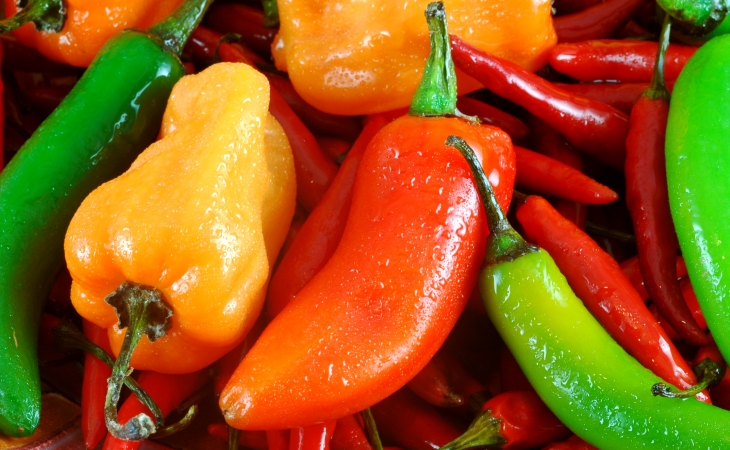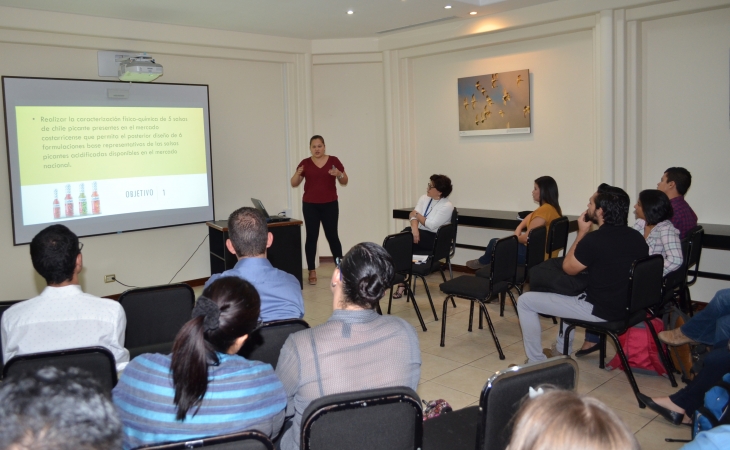The thesis project of Carolina Zúñiga-Arrieta, student at the School of Food Technology from the University of Costa Rica (TA-UCR), was selected as one of the six finalists for the Institute of Food Technologists (IFT) research contest.

The project evaluated the effect of pH, the addition of acidifier, and the filling temperature on the microbiological stability of acidified hot chili sauces.
This will allow her to participate, along with other young people from North America, in the Undergraduate Research Competition next June, in the city of Las Vegas, Nevada, United States of America (USA).
Thus, Zúñiga becomes the first student coming from a university outside the US and Canada who passes to the finals of this prestigious competition.
The director of the thesis is the researcher at the National Center for Food Science and Technology (CITA) and a professor at the School of Food Technology, Dr. Jessie Usaga- Barrientos.
Dr. Usaga acknowledged that "this achievement would not have been possible without the financial support from the Vice-Rectory for Research through the financing of research project No. 735-B5-246 and the fund for final graduation work awarded to the student through the fund for undergraduate students 2015-2016.”
“Without a doubt, this fund is an excellent initiative that strengthens research and also encourages young students to become actively involved in sciences and their application,” concluded the researcher.
Student Zúñiga, will have to give an oral presentation and then answer a round of questions before a jury of experts about her research entitled "Evaluation of the effect of pH, the addition of acidifiers, and the temperature of filling on the microbiological stability of acidified hot chili sauces." She must also present a poster about this project.
Zúñiga conducted research at the National Center for Food Science and Technology (CITA) to get a degree in Food Technology at UCR.
In the formulation of the project, the young student explains that her main objective is “to evaluate the effect of pH and organic acids, commonly present in the acidified chili sauce formulas marketed in Costa Rica, on the microbiological stability of the product, after applying a heat treatment and cold filling.”
“It is expected to determine whether the conditions studied allow to guarantee the microbiological stability of the sauces, thus avoiding their deterioration in normal storage conditions.”
According to Zúñiga, “the reduction of the pH of foods through the addition of organic acids is a strategy widely used by the food industry as it prevents spore germination of spoilage microorganisms and pathogens, particularly Clostridium botulinum.”
This award-winning research project is part of several projects of undergraduate students who won the "Graduation Final Work Support Fund" from the Vice-Rectory for Research at UCR during 2015-2016.
The Fund provides ₡ 500,000 colones to each one of the winners to carry out their final graduation work in the context of a project or research program registered in this Vice-Rectory under the supervision of experienced researchers.
Since its creation in 2010, this incentive has provided partial funding for 48 thesis projects at the graduate level in different areas of knowledge, thus stimulating a greater link between academic training and research.
Hence, the students strengthen their academic training alongside these experienced researchers, while contributing to the advancement of science in our country.
Several of the funded projects have achieved presentations in national and international scientific forums, which besides being a great academic stimulus for the students, reflects on the international impact of research performed at UCR and in our country.

Carolina Zúñiga-Arrieta, a student at the School of Food Technology, presented the results of her research in an activity carried out in March 2017 at the Vice-Rectory for Research.